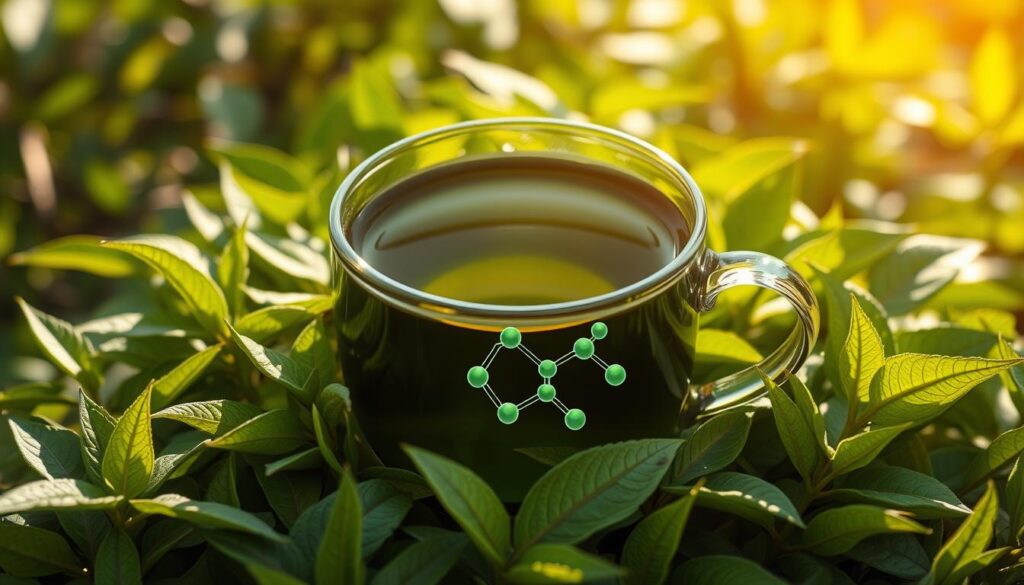Green tea has gained significant attention as a potential aid for weight loss, thanks to its unique bioactive compounds like caffeine and epigallocatechin gallate (EGCG). These substances have been shown to boost metabolism, enhance fat burning, and potentially contribute to modest weight loss in some individuals. While the impact of green tea on weight loss varies, its benefits extend beyond just shedding pounds, including potential improvements in cardiovascular health and reduced risk of certain diseases.
Key Takeaways:
- Green tea contains bioactive compounds like caffeine and EGCG that can boost metabolism and fat burning.
- Studies show green tea can lead to modest weight loss, with more significant results in studies conducted in Japan.
- Green tea’s benefits extend beyond weight loss, including potential improvements in heart health and disease risk reduction.
- The exact weight loss impact of green tea can vary among individuals due to factors like dosage, caffeine sensitivity, and overall lifestyle.
- Further research is needed to determine the optimal green tea consumption for maximum weight loss benefits.
Understanding Green Tea’s Weight Loss Properties
The weight loss benefits of green tea can be largely attributed to its active compounds, primarily green tea catechins and caffeine in green tea. These substances work in synergy to enhance fat oxidation and boost metabolic rate, making green tea an effective tool for weight management.
The Science Behind Green Tea’s Effectiveness
Studies have shown that up to 42% of green tea contains catechins, with the most potent being epigallocatechin gallate (EGCG). Additionally, a typical 2.5-gram serving of green tea provides around 20-50 mg of caffeine in green tea. The combination of these green tea catechins and caffeine has been linked to increased fat burning and energy expenditure.
Key Active Compounds in Green Tea
- Catechins: Potent antioxidants that can inhibit the breakdown of norepinephrine, a hormone that stimulates fat burning.
- Caffeine: A stimulant that can enhance metabolic rate and promote the release of fatty acids from fat stores.
- L-theanine: An amino acid that can work synergistically with caffeine to produce a more focused and energetic state.
Historical Use and Modern Research
Green tea has been a staple in traditional Chinese medicine for centuries, valued for its potential health benefits. In modern times, numerous studies have examined the role of green tea extract and green tea beverages in weight loss and weight management. While results vary across different populations, the research suggests that regular green tea consumption may contribute to a reduction in body weight and body fat.
“Habits like drinking an average of 434 mL (approximately 3 cups) of green tea per day were associated with a 19.6% reduction in body fat percentage over ten years.”

Furthermore, consuming at least four cups of green tea daily (or 600-900 mg of tea polyphenols) may lead to a decrease in body weight or body fat. The potential benefits of green tea for weight loss continue to be a topic of active research and exploration.
Benefits of Green Tea for Weight Loss
Green tea has long been touted for its potential benefits in aiding weight loss. This ancient beverage contains a unique combination of compounds that may contribute to its effectiveness in supporting healthy weight management.
One of the key ways green tea can help with weight loss is through its ability to boost metabolism and enhance fat burning. Studies suggest that the active compounds in green tea, such as green tea and thermogenesis, can increase energy expenditure by up to 3-4% per day. This modest but consistent calorie-burning effect can add up over time and support long-term weight management when combined with a balanced diet and regular exercise.
Additionally, green tea may influence fat oxidation, or the process of burning stored fat for energy. Green tea and fat burning compounds like EGCG have been shown to promote the breakdown of fat cells, potentially aiding in the reduction of overall body fat levels.
| Green Tea Nutritional Facts | Amount per 8 fl oz |
|---|---|
| Calories | Less than 3 |
| Caffeine | 28 mg |
| Antioxidants (Polyphenols) | Abundant |
While the weight loss effects of green tea may be modest, incorporating it into a balanced lifestyle can contribute to overall health and wellness. By leveraging the unique properties of this ancient beverage, individuals can take a proactive step towards their weight loss goals.

“Drinking green tea may aid in weight loss by increasing energy expenditure and fat oxidation, though the overall effect is likely to be small.”
How EGCG and Catechins Boost Metabolism
Green tea’s potent weight loss benefits can be largely attributed to the key active compound EGCG ((-)-epigallocatechin-3-gallate) and other catechins. These natural compounds play a crucial role in enhancing metabolism, which is central to the tea’s fat-burning properties.
EGCG’s Role in Fat Oxidation
EGCG, the predominant catechin in green tea, has been shown to inhibit an enzyme that breaks down norepinephrine, a hormone that stimulates fat breakdown. By preserving norepinephrine levels, EGCG promotes increased fat oxidation, leading to more efficient fat metabolism.
Metabolic Rate Enhancement
The combination of catechins and caffeine in green tea works synergistically to enhance metabolic rate. This process, known as thermogenesis, increases the body’s calorie-burning potential, contributing to weight loss over time. Studies have found that green tea extract supplementation can raise metabolic rate by 4-5% on average.
Thermogenic Properties
Green tea’s thermogenic effects are particularly pronounced during exercise. The active compounds in the tea stimulate fat oxidation and calorie expenditure, making workouts more efficient for weight loss. This thermogenic boost can help you torch more calories, even hours after your workout.
| Compound | Concentration in Green Tea | Effect on Metabolism |
|---|---|---|
| EGCG | 50-100 mg per 250 mL serving | Inhibits enzyme that breaks down norepinephrine, promoting fat oxidation |
| Caffeine | 30-40 mg per 250 mL serving | Works synergistically with catechins to enhance metabolic rate and thermogenesis |
By harnessing the power of EGCG and other green tea catechins, you can unlock the beverage’s full potential for boosting metabolism and driving weight loss.

Green Tea’s Impact on Fat Burning During Exercise
Numerous studies suggest that green tea can enhance fat burning during physical activity, potentially aiding weight loss efforts when combined with regular exercise. One study found that men who took green tea extract before exercise burned 17% more fat than those who didn’t. The combination of green tea’s active compounds, such as EGCG and catechins, with exercise may lead to increased fat oxidation and improved exercise performance.
Research indicates that green tea extract (GTE) can increase fat oxidation during exercise, both in the short and longer term. Studies have shown that GTE, particularly when consumed in higher doses, can result in a 20% higher fat oxidation rate compared to caffeine alone. Additionally, GTE has been found to elevate 24-hour fat oxidation by 8% and increase energy expenditure.
The thermogenic and metabolic-boosting properties of green tea’s active compounds, like EGCG, seem to play a significant role in enhancing fat burning during physical activity. Higher doses of EGCG in green tea have been suggested to be more effective in stimulating fat oxidation, although different EGCG doses have not shown significant differences in 24-hour fat oxidation rates.
While the precise mechanisms are still being investigated, the synergistic effect of green tea and exercise appears to be a promising strategy for weight loss and body composition improvements. Incorporating green tea consumption into a regular exercise routine may help individuals achieve their fitness and wellness goals more effectively.

| Study Findings | Impact on Fat Oxidation |
|---|---|
| Green tea extract (GTE) consumption | Increased 24-hour fat oxidation by 8% and energy expenditure |
| Higher EGCG doses in green tea | More effective in stimulating fat oxidation |
| GTE compared to caffeine alone | Resulted in 20% higher fat oxidation rate |
The synergistic effect of green tea and exercise holds promise for weight loss and body composition improvements. By incorporating green tea consumption into a regular exercise routine, individuals may be able to achieve their fitness and wellness goals more effectively.
The Role of Green Tea in Appetite Suppression
While some claim that green tea can help reduce appetite and support weight loss, the research results on this topic have been mixed. Green tea may influence certain hormones related to hunger and satiety, but the effects can vary considerably among individuals. Additionally, green tea may play a role in regulating blood sugar levels, which could potentially reduce food cravings and overeating.
Hormonal Effects on Hunger
Some studies suggest that the compounds in green tea, such as caffeine and catechins, may have a subtle influence on hormones that control appetite and feelings of fullness. However, the extent to which green tea can reliably suppress hunger remains an area of ongoing research and debate.
Blood Sugar Regulation
There is evidence that green tea consumption may help regulate blood sugar levels, which could in turn reduce cravings and the tendency to overeat. By moderating fluctuations in blood sugar, green tea may assist in maintaining a sense of satiety and prevent sharp dips that can lead to hunger pangs.
Nonetheless, more comprehensive research is still needed to conclusively determine the extent of green tea’s impact on appetite suppression and its role in weight management through this potential mechanism.
| Statistic | Value |
|---|---|
| Canadians above ideal body weight | At least 60% |
| RCTs included in Cochrane Systematic Review | 14 |
| RCTs conducted outside Japan (participants) | 6 (532) |
| RCTs conducted in Japan (participants) | 8 (1030) |
| Adverse effects reported | Mild to moderate (hypertension and constipation) |
“Many researchers have reported that obesity is a major risk factor for diabetes, cardiovascular diseases, and several forms of cancer including breast, colon, and prostate cancer, pulmonary diseases, osteoarticular diseases, and metabolic diseases.”
Optimal Green Tea Consumption for Weight Loss
When it comes to using green tea for weight loss, the optimal amount to consume is a topic of ongoing research. While the exact dosage is not definitively established, most studies have focused on green tea extracts that contain higher concentrations of catechins compared to typical brewed green tea.
Generally, consuming 2-3 cups of green tea per day is considered a safe and potentially beneficial range for weight loss. However, the effects can vary based on individual factors such as metabolism, caffeine sensitivity, and overall health status.
It’s important to note that green tea should be used as a complement to a healthy diet and regular exercise regimen, not as a standalone solution for weight loss. The benefits of green tea for weight loss are best realized when it’s part of a comprehensive lifestyle.
Considerations for Green Tea Dosage
- Green tea extracts used in research studies often contain higher concentrations of active compounds like EGCG compared to a typical brewed cup of green tea.
- Individuals with higher caffeine sensitivity may need to adjust their green tea intake to avoid potential side effects like jitteriness or insomnia.
- Consulting with a healthcare professional can help determine the optimal green tea dosage based on your personal health goals and needs.
“The key is to find a sustainable green tea consumption level that fits your lifestyle and supports your overall wellness goals.”
Ultimately, the how much green tea for weight loss will vary from person to person, but incorporating 2-3 cups of green tea per day as part of a balanced diet and active lifestyle can be a simple and effective way to support your weight management efforts.

Green Tea and Visceral Fat Reduction
Emerging research suggests that green tea may be particularly effective in targeting visceral fat, the harmful fat that accumulates around vital organs. Studies on green tea catechins, the active compounds found in the beverage, indicate that a significant percentage of the fat lost during green tea consumption is often visceral fat.
Targeting Abdominal Fat
This effect could have important implications for long-term health, as visceral fat is strongly associated with an increased risk of type 2 diabetes and cardiovascular disease. In one study, high-fat-fed mice that exercised regularly and ingested green tea extract showed an average body mass reduction of 27.1 percent and an average abdominal fat mass reduction of 36.6 percent after 16 weeks.
Long-term Effects on Body Composition
The potential of green tea to influence body composition goes beyond short-term weight loss. A study of middle-aged Korean adults found that women who consumed over 4 cups of green tea per week had lower rates of abdominal obesity. Additionally, a recent analysis of 11 human trials with green tea preparations reported an average body weight loss of 1.31 kilograms in the intervention groups compared to the control groups.
The findings suggest that long-term consumption of green tea may contribute to beneficial changes in body composition, potentially reducing the harmful accumulation of visceral fat around the abdomen. This could have far-reaching implications for the management of obesity and associated metabolic disorders.
While the research on green tea’s impact on visceral fat reduction is promising, it’s important to note that the results have been variable in human studies, with limited and mild weight loss benefits overall. Nonetheless, the potential for green tea to target abdominal fat and positively influence long-term body composition warrants further investigation.
Safety Considerations and Potential Side Effects
While green tea is generally considered safe, excessive consumption can lead to some side effects due to its caffeine content. These may include insomnia, nervousness, and increased heart rate. Additionally, green tea can interact with certain medications, so it’s important to consult a healthcare professional before starting any new supplement regimen, especially for individuals with pre-existing health conditions.
According to research, the acute consumption of green tea has been linked to improved endothelial function in healthy individuals. However, green tea extract has also shown potential risk of diminished folic acid bioavailability, influencing folic acid pharmacokinetics in healthy volunteers. Additionally, in obese subjects with metabolic syndrome, green tea was found to have minimal effects on biomarkers of inflammation.
While the majority of adverse effects reported in studies were mild to moderate, there have been a few cases requiring hospitalization in the green tea preparations group. It’s crucial to be mindful of the safety of green tea supplements and to consult with a qualified healthcare provider to ensure safe and appropriate usage.
“The consumption of green tea has evidenced a remarkable reduction in blood pressure, inflammatory biomarkers, oxidative stress, and improvements associated with insulin resistance in obese hypertensive patients.”
In conclusion, while green tea can offer numerous health benefits, it’s essential to be aware of the potential green tea side effects and to consume it in moderation, especially for individuals with pre-existing medical conditions or taking certain medications. It’s always best to consult a healthcare professional before incorporating green tea or any other supplement into your daily routine.
Conclusion
In conclusion, the benefits of green tea for weight loss and overall health are well-supported by a wealth of research. While its effects may be modest, green tea can be a valuable addition to a comprehensive weight management plan. The combination of catechins, like EGCG, and caffeine in green tea has been shown to boost metabolism, enhance fat burning, and suppress appetite, particularly when coupled with regular exercise.
Beyond weight loss, green tea consumption has also been linked to a lower risk of various health conditions, including stroke, type 2 diabetes, and cognitive decline. Its high antioxidant content and potential neuroprotective properties make it a promising beverage for supporting overall well-being. However, it’s important to remember that green tea should not be viewed as a magic solution, but rather as a complement to a balanced diet and active lifestyle.
As with any dietary supplement, individuals should exercise caution and consult with healthcare professionals, especially when considering green tea extract supplements, which may have different safety profiles compared to brewed green tea. By incorporating green tea into a holistic approach to health and weight management, individuals can potentially reap the benefits of this ancient beverage and support their benefits of green tea for weight loss and green tea and overall health.
FAQ
What are the key benefits of green tea for weight loss?
How does green tea aid in fat burning and weight management?
What is the role of EGCG and catechins in green tea’s weight loss benefits?
Can green tea help with fat burning during exercise?
Does green tea have an appetite-suppressing effect?
What is the optimal amount of green tea for weight loss?
Can green tea help reduce visceral fat?
Are there any potential side effects or safety considerations with green tea?
Source Links
- Green tea for weight loss and weight maintenance in overweight or obese adults
- How Green Tea Can Help You Lose Weight
- Green tea for weight loss: Does it work?
- Green Tea To Slim Down: How It Can Help Your Weight Loss | Diet vs Disease | Diet vs Disease
- 5 Types of Tea That May Help With Weight Loss
- Are There Health Benefits to Drinking Green Tea?
- Does green tea help with weight loss, belly fat? What to know about its health benefits
- 10 Evidence-Based Benefits of Green Tea
- Green Tea Catechins and Sport Performance – Antioxidants in Sport Nutrition
- Frontiers | EGCG Reduces Obesity and White Adipose Tissue Gain Partly Through AMPK Activation in Mice
- The Effect of Green Tea Extract on Fat Oxidation at Rest and during Exercise: Evidence of Efficacy and Proposed Mechanisms
- Could Tea Help You Lose Weight?
- Does Green Tea Burn and Reduce Belly Fat and Help You Lose Weight?
- Can green tea preparations help with weight loss?
- The anti-obesity effects of green tea in human intervention and basic molecular studies – European Journal of Clinical Nutrition
- How to Drink Green Tea for Weight Loss
- The effects of green tea consumption on metabolic and anthropometric indices in patients with Type 2 diabetes
- Research suggests that green tea, exercise boost weight loss, health | Penn State University
- Drinking Green Tea for Weight Loss & Fat Burning | Signos
- The Beneficial Effects of Principal Polyphenols from Green Tea, Coffee, Wine, and Curry on Obesity
- GREEN TEA: Overview, Uses, Side Effects, Precautions, Interactions, Dosing and Reviews
- Green tea for weight loss and weight maintenance in overweight or obese adults
- Green tea Information | Mount Sinai
- Green tea: Health benefits, side effects, and research
- Green tea for weight loss and weight maintenance in overweight or obese adults – PubMed
- Green Tea For Weight Loss: Does It Help? Know The Benefits





